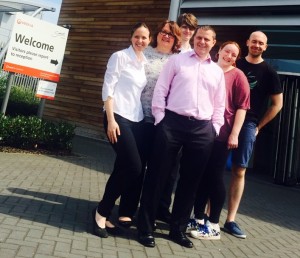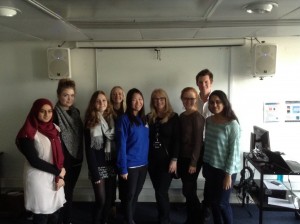[This week’s guest post comes courtesy of Emily Shovlar, a third-year English Language & Literature student and enthusiastic EcoSoc member. The views presented do not necessarily reflect those of King’s Sustainability]
Let’s call this post, in honour of one of the organisations it features, ‘a story of things going right’.
That’s how the 10:10 project’s website describes the hashtag it created. #Itshappening is a Twitter treasure trove of sustainable action, mostly in the uplifting form of smiling primary school children and their new solar panels. It’s also a story of community efforts to combat climate change and progress towards a green future. What better way, then, for the Environment Society at King’s (EcoSoc) to show its rapidly increasing numbers and momentum than by hosting a panel event entitled ‘#Itshappening: how educators and organisations are bringing about green change’?
On 25th November, EcoSoc gathered in the Franklin-Wilkins Building to have our hearts and minds made brighter by five brilliant speakers. We assembled a hot water machine, organic fair-trade tea and biscuits, rows of chairs, the speakers and ourselves. It was our second panel event of the semester, and there was a general feeling that we were getting rather good at this. The stage was set for inspiration.

Mal’s enthusiastic arm span
The first speaker, tying perfectly in with #itshappening, was from the 10:10 project itself: Malachi Chadwick, its Communications Manager. Mal, his arm span enthusiastically growing with every statistic, described his work with the Solar Schools project, as documented on Twitter, in which 10:10 organises crowdfunding for primary schools to buy solar panels. There are now 66 ‘solar schools’ in Britain, funded by over £430,000 of community donations, with places for 20 new schools each year. The project is a success not only for the schools, some of which are entirely self-sufficient for power on sunny days, but for the whole community. Mal told us that 70% of online donors said the project made them feel part of a community, and that 45% of volunteers were keen to take part in more community projects afterwards. Even better, he pointed out that of the people who volunteer with the solar schools, 71% have changed their behaviours to save energy, and 29% have installed renewable energy in their own homes. By the time he got to these galvanising statistics, Mal’s arms were as uplifted as his audience.
This development of community is vital to sustainability: it’s all about localising, not globalising. It seems obvious to start with the education system if we want to instil green thinking, since, as Mal rightly said, schools are at the heart of their communities and connect to hundreds of adults and children alike.

The inspiring David Dixon, sustainable headteacher
Our second speaker expressed this connection from his own position within education. David Dixon is Head of Mulgrave Primary in Woolwich, a deprived and highly multicultural school. He is a truly inspirational headteacher: under his care the school has improved its Ofsted ratings, encouraged more community cohesion (especially after the nearby Lee Rigby incident in 2013) and embarked on a curriculum of Education for Sustainable Development (ESD). More impressive still, he completed a doctorate while Headteacher, focusing on a ‘green leadership model’. He asked: what do leaders of sustainable primary schools have in common? He found: they had childhoods immersed in nature, they had strong communities and support networks, they were confident and go-getting and were happy to be disruptive to the education system. David feels strongly that “Improving the understanding of the connections between nature, a man made world and social justice is the way to develop less destructive citizens”. His work on ESD lets children choose how they live, and think about what it means to be a green individual.
Third up was Yolanda Barnas. She was a special invite from EcoSoc’s own Annie, whom she taught in her role as Languages teacher at the Ellen Wilkinson School for Girls in west London. Passionate like all the best teachers, she showed us the outdoor classroom she’d created at the school, from a semi-landfill wasted space, and described her efforts over the years to make the school greener. These included a wildlife garden in a little-used space against a school building, and a silver sustainability award for the school’s travel arrangements. What she really showed us, at King’s, was how one diligent person can transform an organisation or even a system. Her efforts might be small-scale, in that they only affect one school, but the sustainability movement is founded upon such green-minded individuals who change their own communities. Her dedication is exactly what we all need.
After Ms Barnas came Simon Goldsmith, Head of Sustainability at the University of Greenwich. Greenwich is brilliant at sustainability: this is recognised by its awards including Outstanding Contribution to Sustainable Development, and by its top-ten position in the university Green League for the last five years. His stance is that since universities are brimming with future citizens, it’s vital to embed sustainability within them (EcoSoc couldn’t agree more). Simon, like Mal, offered an armful of brilliant statistics: Greenwich has reduced its carbon footprint by 22% since 2005 and plans to cut it by a further 40% by 2020. It’s installed 200 solar panels in student accommodation, and put power-down software on every single one of its computers. For those of us who took part in the King’s Blackout, switching off hundreds of unused computers, the last statistic in particular is a worthy goal.

Simon Goldsmith sharing Greenwich’s sustainability secrets and plans for the future
Speaking of King’s, our final speaker was Tom Yearley, our very own Energy Manager, who featured recently on this blog. He only joined King’s in September but admits happily that his ultimate joy would be leaving the job, because King’s had woven sustainability into its ethos to such an extent that Tom became surplus. He gave us his vision for the coming years: student workgroups on sustainability, to make sure our voices cohere with his own plans; and large grants to improve efficiency in what is, we’re painfully aware, an un-green place of study.
Tom is guaranteed to encounter EcoSoc again, even more than the other four speakers – but it was a true privilege for us to encounter them all at once, in an evening of inspiration which confirmed all we hope to do to make ourselves, King’s, London and the UK greener. It was sustainably grown and articulately honed food for thought, and it was most certainly ‘a story of things going right’.
– Emily Shovlar (emily.shovlar@kcl.ac.uk)
 This week is Bike Week at King’s. Bike Week is a national campaign to raise awareness of the benefits of cycling under the headline ‘everyday cycling for everyone’.
This week is Bike Week at King’s. Bike Week is a national campaign to raise awareness of the benefits of cycling under the headline ‘everyday cycling for everyone’.












